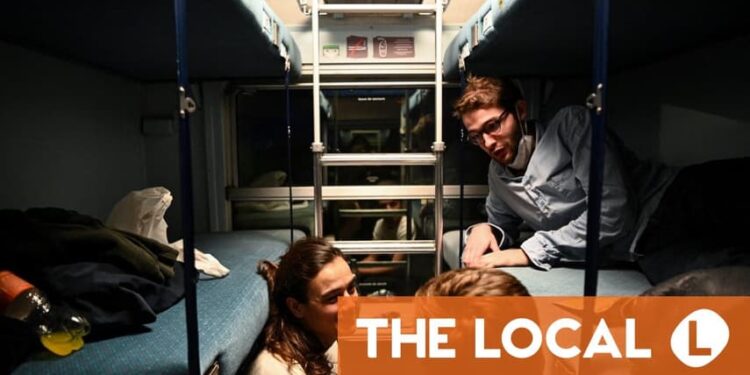Buried away in the latest report by the UN’s Intergovernmental Panel on Climate Change about the changes needed in different sectors to reduce their greenhouse gas emissions is this startling graphic (below) – it is in the transport sector where the costs to decarbonise are lowest, and even have cost savings associated with them.
Transport: Save money, protect the climate 🚶♀️🚶♂️🚲🚃🚋🔌@IPCC_CH pic.twitter.com/M04fFglFmN
— 🚶♀️🚶♂️🚴🚍⚡ (@TUMInitiative) April 5, 2022
So with spring blossom in the trees and thoughts turning to planning summer holiday trips, why not look for a greener route to the sun – by taking the train rather than the plane?
In terms of the public debate, trains are back in fashion.
On the back of Greta Thunberg’s efforts to shame those who fly, and to push greener alternatives instead, media from The New York Times to the BBC are discussing the renaissance of long distance travel by train in Europe, especially night trains.
One railway company – Austria’s ÖBB – has seized the moment and has ordered a fleet of 33 new 7 carriage night trains, the first of which will be on Europe’s tracks from December this year.
Advertisement
The argument for night trains is a simple one, namely that by travelling at night you save yourself a night in a hotel at your destination, and passengers are happy to make a longer trip while they are asleep than they would during the day – when passengers normally will not spend more than 6 hours in a train.
The problem is that beyond ÖBB’s plans comparatively little is happening in long distance cross border night trains in Europe.
There are dozens of further connections where night trains would make sense – think of routes like Amsterdam-Marseille or Cologne to Warsaw for example – but we cannot hope that the Austrians will run those. The European Commission conservatively estimated in December 2021 that at least 10 more night train routes, over and above those planned by ÖBB, would be economically viable, and running those lines would need at least 170 new carriages to be ordered. But so far no operator has been tempted.
The main players in European rail – Deutsche Bahn, Renfe, SNCF and Trenitalia – have no interest in night trains, and even only limited interest in cross border rail at all.
More profitable national daytime services are their focus. The French and Italian governments have been making noises to push SNCF and Trenitalia respectively to run more night time services but – you guessed it – only on national routes.
A few small private players have sought to run night services – Sweden’s Snälltåget and Amsterdam-based European Sleeper for example, but they have struggled to scale.
All of this is on top of the headaches that cross border rail in Europe has faced for years, namely the difficulty of booking tickets on international trains (sometimes two or more tickets are needed), timetables that are not in sync if you have to change train at a border, and lack of clear information and compensation if something goes wrong. Even finding out what trains run is often a headache, as no complete European railway timetable exists.
The EU nominated 2021 as the European Year of Rail with the aim of drawing attention to what rail can do in Europe, but the year closed with scant little progress on any of this multitude of thorny problems – in the main because the railway companies themselves do not want to solve them.
Helping intrepid cross border travellers find their way around these practical barriers has become a kind of cottage industry in the social media era.
Advertisement
Communities of sustainable transport nerds of which I am a part on Facebook and Twitter help each other to find the best routes and cheapest tickets, and the venerable Man in Seat 61 website acts as a kind of FAQ for international rail.
There’s nothing quite like waking up on a summer morning and seeing the sun on the Mediterranean or the wooded slopes of the Alps out of the window of a night train. But travel experiences like that are not nearly as simple or mainstream as they should be – and it is high time the railway industry stepped up.
Are you hoping to travel across Europe by train instead of plane but finding it difficult to organise? Feel free to get in touch and with Jon’s expertise we’ll try to help you. Email [email protected]
Jon Worth is a Berlin-based blogger who specialises in European train travel. You can his original post on this subject HERE.
Source link : https://www.thelocal.com/20220408/opinion-trains-are-in-fashion-so-why-is-rail-travel-across-europe-still-so-difficult
Author :
Publish date : 2022-04-08 07:00:00
Copyright for syndicated content belongs to the linked Source.



